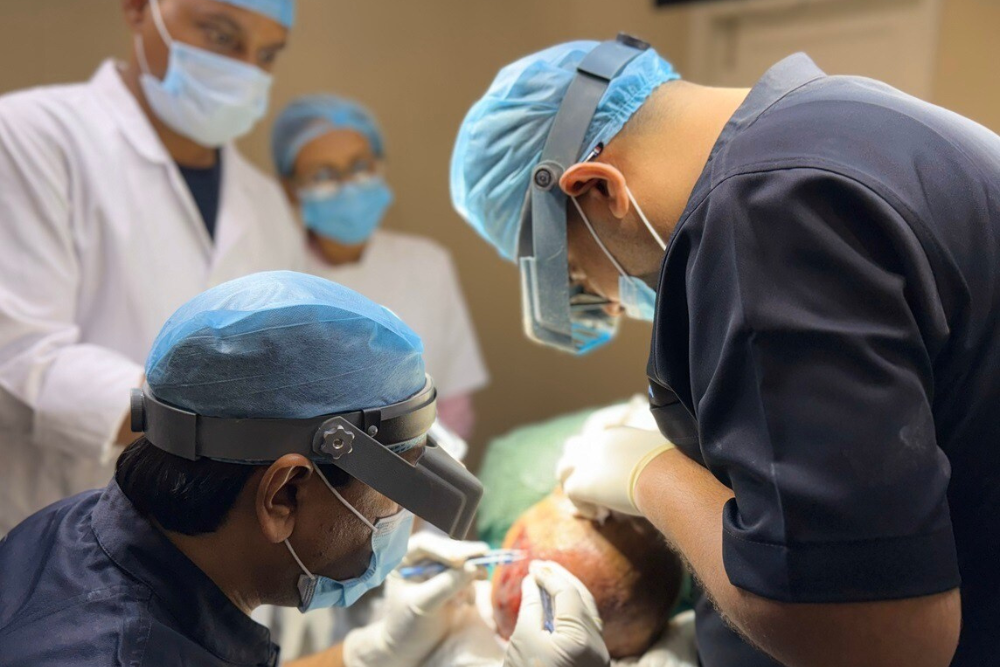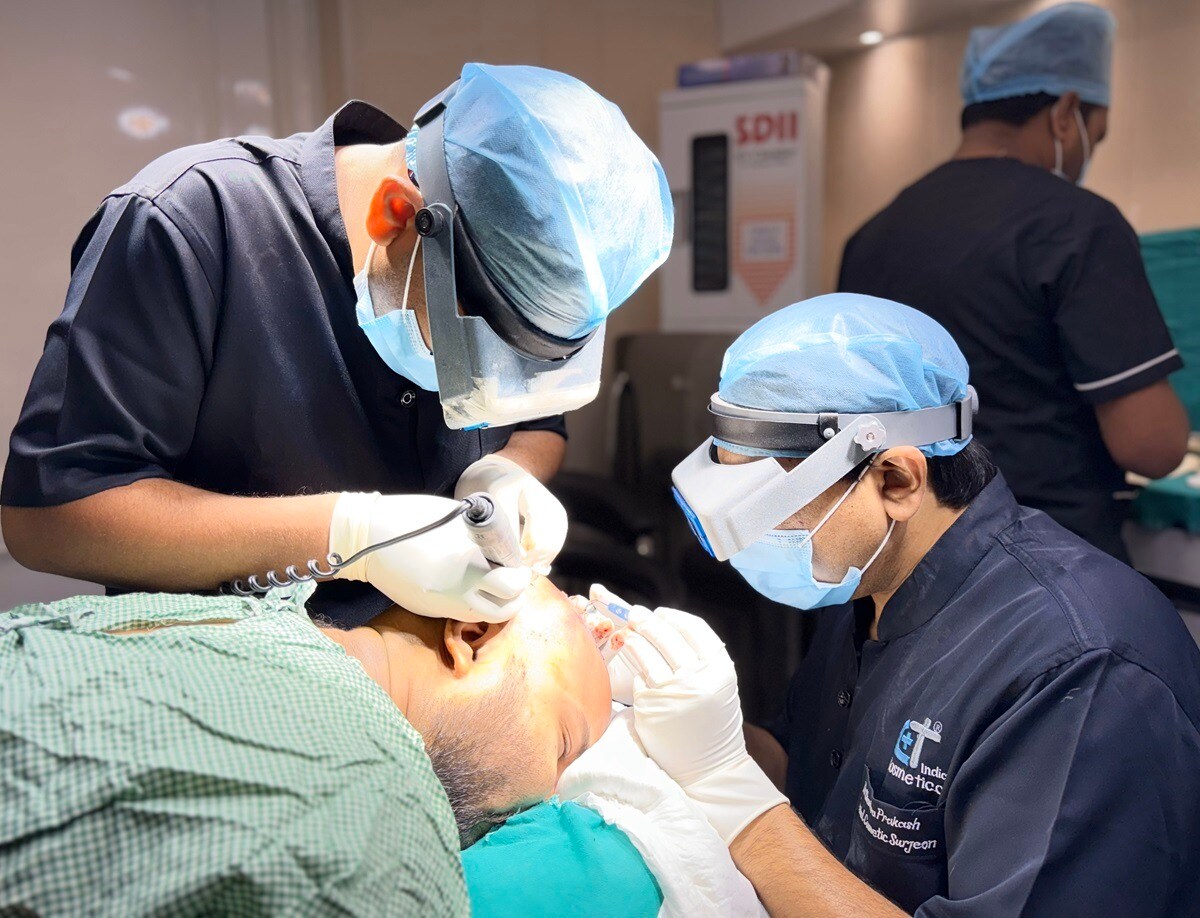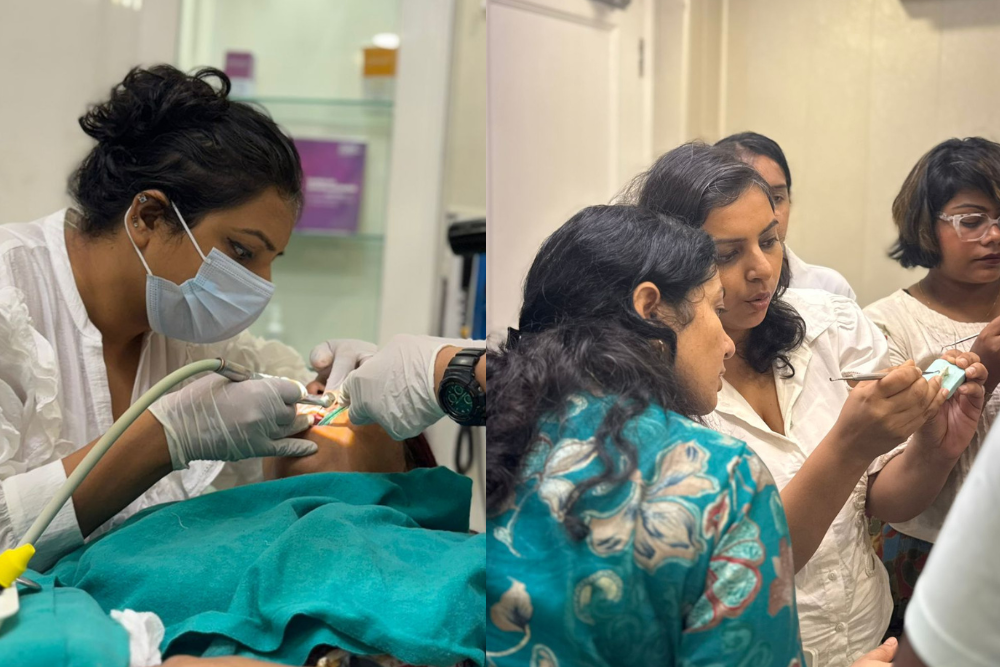27 Feb 2025
PG Diploma in Aesthetic Dentistry
-
Category
Trichology
-
review
0 reviews
-
price
₹70800
Masters Course in Hair Transplantation
Master course in Hair Transplantation is an advanced training program in hair transplantation techniques that helps open the doors to a lucrative career for aspiring doctors, physician and surgeons to become Eminent hair transplant surgeons.
Duration: 3 months Online (5 days Hands-on)
Masters Certificate: 3 months
Training: Live Sessions & Hands-on
Hair transplant course description
Hair loss can significantly impact lives, affecting confidence & self-esteem.
As the demand for hair restoration procedures continues to rise, mastering the latest techniques in hair transplantation becomes increasingly crucial.
Course Overview
This intensive program delves deep into the intricate world of hair transplantation.
Scalp anatomy and hair biology – Gain a profound understanding of the hair growth cycle, follicular unit structure, and various types of hair loss.
Surgical techniques - Master both Follicular Unit Extraction (FUE) and follicular Unit Transplantation (FUT) methods including strip harvesting micro FUE.
Donor area management - Learn Strategies for optimal donor site selection, harvesting, and closure to ensure sustainable graft supply.
Hairline design
Graft preparation & Placement
Develop meticulous graft dissection, storage and placement skills for optimal graft survival and growth.

Benefits of Enrolling
Intensive hands-on training on hair transplant workshop- your surgical skills through extensive practical sessions on live patients under the guidance of experienced hair transplant surgeons.
Advanced techniques
Comprehensive curriculum -Gain a well-rounded understanding of all aspects of hair transplantation, from patient consultation to surgical execution & post-operative care.
Investing in your future
A master Course in hair transplantation is an investment in your professional development & opens doors to a rewarding career in a thriving field. With the increasing demand for hair restoration procedures, skilled & qualified hair transplant Surgeons are highly sought-after.
Why one should do this program?
Growing demand Hair transplantation is a rapidly growing field, with the global market expected to reach $ 24.2 billion in 2026. This means that there is a high demand for qualified hair transplant Surgeons.
Lucrative Carrer
Hair transplant Surgeons can earn a good Salary.
Challenging & rewarding
Hair transplantation is a challenging & rewarding field. It requires a high level of skill and precision but, it can also be very satisfying to see the positive impact that you can have on patient's lives.
Help people
Hair loss can be a very devastating experience for many people. Hair transplantation can help people to regain their confidence and self-esteem.
Here are some specific skills that you will learn in a master's Course in hair transplantation.
- Anatomy & physiology of the scalp and hair follicles.
- Hair loss diagnosis & treatment
- Follicular unit Extraction and Follicular unit transplantation(FUT) techniques.
- Scalp micropigmentation
- Hairline design
- Patient care & communication.
If you are interested in pursuing a career in hair transplantation a master's course is a great investment. It will give you the skills and knowledge you need to be successful in this field.
What is the future scope of the industry?
Increasing demand
Hair loss affects millions of people worldwide, and concerns about appearance continue to rise. This fuels the demand for effective hair restoration solutions making hair transplantation a desirable procedure.
Growing awareness and acceptance of social media & celebrities openly discussing hair transplants contribute to destigmatizing the procedure and raising awareness. This wider acceptance expands the potential client base.
Technological advancement
Continuous improvements in techniques like follicular unit Extraction (FUE) & robotic hair transplantation procedures. Less invasive, more precise, and with faster recovery times; attracting a broader range of patients.
Expanding The hair transplantation market is expected to reach $24.2 billion by 2027, with a compound annual growth rate(AGR) of 14.2% This rapid growth indicates significant potential for career opportunities in the field.
Geographic diversification
The market is expanding beyond traditional strongholds like the US & Europe gaining traction in Asia and other emerging regions, further boosting demand for skilled professionals.
Specialization and Sub-Segments.
The industry is witnessing increasing specialization,
with practitioners focusing on specific techniques like beard transplantation, or Corrective surgeries. This creates opportunities for skilled professionals.
Integration with other aesthetic procedures. Hair transplantation is often combined with other Cosmetic treatments like scalp micropigmentation or facial rejuvenation, offering practitioners broader career paths.
About master Course in hair transplantation Courses
Hair transplant training programs are designed to equip medical professionals with the knowledge & skills needed to excel in this specialized field. These courses typically cater to doctors, physicians, and surgeons who already have a foundational understanding of medicine and surgery.
Theoretical knowledge
Hair & Scalp anatomy- This includes understanding the structure & function of hair, the hair growth cycle & the anatomy of the scalp.
Types of Hair Loss: you'll into the various causes of hair loss including androgenetic alopecia, and traction alopecia.
Medical treatments for Hair loss -you'll learn about the different, medications & other non-surgical therapies available for managing hair loss.
Hair transplantation Techniques
The course will cover both strip harvesting (FVT) and Follicular Unit Extraction (FUE) techniques in detail, including their advantages and disadvantages.
Planning & consultation - you'll learn how to properly asses patients, design natural-looking hairlines, and discuss pre-operative and post-operative care.
Complications & Management - The Course will equip you with the knowledge to identify and manage
potential complications associated with hair transplantation.
Practical skills
Hands-on training - Master Course often include this.
FAQs
This can vary depending on the Program but, generally, you'll need to be a licensed medical professional (doctor, dermatologist, etc) with some prior experience in surgery or cosmetic procedures.
Gaining advanced knowledge and skills, improving patient outcomes staying updated with the latest technologies, and potentially increasing your earning potential.
The demand for hair transplant specialists is growing with good salaries and career opportunities available.
MD, MS, MDS, OMS, MCH


reviews 0